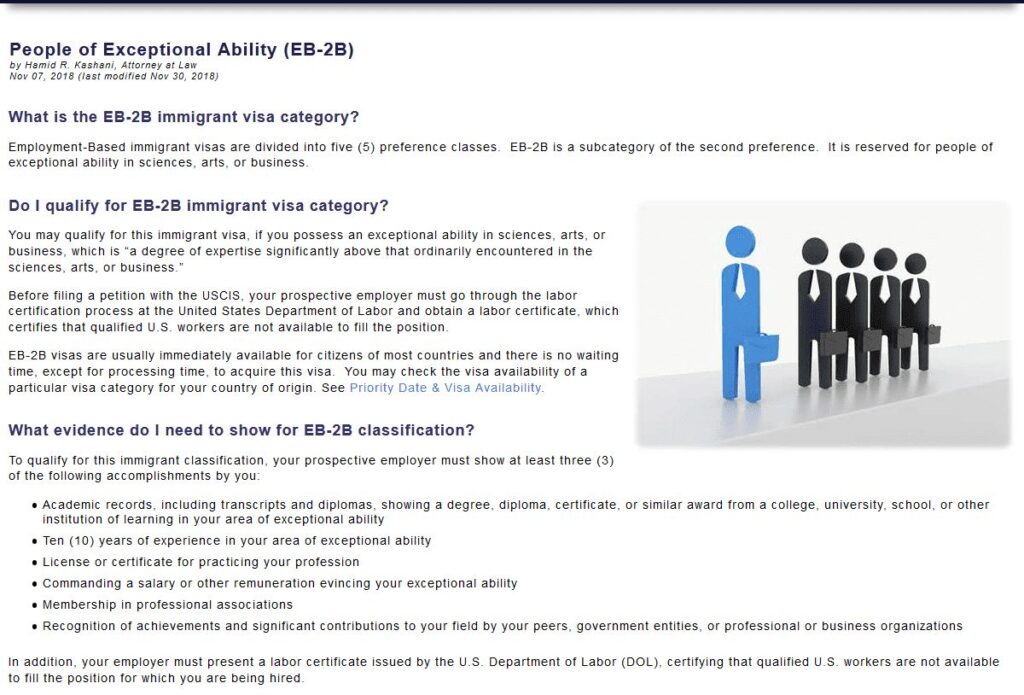The EB-4 visa is a type of employment-based immigrant visa category that is designed for special immigrants who want to work and live permanently in the United States. It is one of the several categories of employment-based visas that are available for foreign nationals who wish to immigrate to the U.S. based on their employment status.
EB-4 Visa- Visa for “Special Immigrants”
The EB-4 visa is also known as the fourth preference visa category, and it is reserved for individuals who are considered “special immigrants” under the U.S. immigration law. The eligibility criteria for the EB-4 visa are defined by the U.S. Citizenship and Immigration Services (USCIS), which is the agency responsible for overseeing immigration to the U.S.
Who is Eligible for EB-4 Visa
To be eligible for an EB-4 visa, the applicant must fall under one of the following special immigrant categories:
Religious workers:
This category is for individuals who have been working for a religious organization in the U.S. for at least two years, and who are coming to the U.S. to work for a qualifying religious organization.
Broadcasters:
This category is for individuals who have been working as broadcasters for at least 15 years for a foreign government-owned media outlet, and who are coming to the U.S. to work for a U.S. media outlet.
Afghan and Iraqi translators:
This category is for individuals who have worked as translators or interpreters for the U.S. government in Afghanistan or Iraq for at least one year, and who have been granted a Special Immigrant Visa (SIV).
Physicians having completed Medical residency in US:
This category is for foreign medical graduates who have completed a medical residency in the U.S. and who agree to work for at least five years in a designated shortage area.
Other special immigrants:
This category includes a wide range of individuals who may be eligible for an EB-4 visa, such as certain employees or former employees of the U.S. government abroad, retired employees of international organizations, and others.
To apply for an EB-4 visa, the applicant must have a job offer from a U.S. employer who is willing to sponsor their visa application. The employer must file a Form I-360, Petition for Amerasian, Widow(er), or Special Immigrant, on behalf of the applicant with the USCIS. In some cases, the applicant may also need to obtain a certification from the USCIS before they can apply for the visa.
The EB-4 visa category has a limited number of visas available each year, and there may be a waiting period before an applicant’s petition is approved and a visa is available. However, once an applicant’s petition is approved and a visa is issued, they can work and live permanently in the U.S. and may be eligible to apply for U.S. citizenship in the future.
There are several limitations of the EB-4 visa, which applicants should be aware of before applying:
Limited number of visas:
The EB-4 visa category has a limited number of visas available each year, and the demand for these visas is often greater than the supply. This means that there may be a waiting period before an applicant’s petition is approved and a visa is available.
Eligibility criteria:
To be eligible for an EB-4 visa, the applicant must fall under one of the special immigrant categories defined by the U.S. immigration law. This means that not everyone is eligible for this visa category, and some individuals may need to look into other visa options.
Job offer requirement:
To apply for an EB-4 visa, the applicant must have a job offer from a U.S. employer who is willing to sponsor their visa application. This can be challenging for individuals who do not have a job offer or who do not have the necessary qualifications or experience for the available positions.
Certification requirement from USCIS:
In some cases, the applicant may also need to obtain a certification from the U.S. Citizenship and Immigration Services (USCIS) before they can apply for the visa. This certification process can be time-consuming and may require additional documentation and information.
Lengthy processing times:
The processing times for EB-4 visa applications can be lengthy, and it may take several months or even years for an applicant’s petition to be approved and a visa to become available. This can be frustrating for individuals who are eager to start working and living in the U.S.
Visa retrogression- few Countries may have limited quota of EB-4 Visas:
Due to high demand, certain countries may experience visa retrogression, which means that the availability of EB-4 visas may be limited for individuals from these countries. This can result in longer waiting periods for visa issuance.
Overall, the EB-4 visa can be a useful option for individuals who fall under the special immigrant categories and have a job offer from a U.S. employer. However, due to the limitations and requirements of this visa category, it may not be the best option for everyone.

